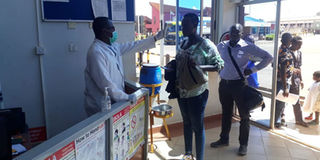Kenya on high alert for Ebola after cases found in DRC

Travellers are screened for the Ebola virus before getting into Kenya at the Busia One Stop Border Post on June 12, 2019.
Kenyan health officers at all entry ports are on high alert following an Ebola outbreak in the Democratic Republic of Congo.
Dr Samoel Khamadi, a senior research scientist and Director Centre for Virus Research at Kenya Medical Research Institute (KEMRI), said all measures are in place to detect Ebola.
"Ministry of Health officials are closely monitoring movement across the border and especially those coming from the region around DRC," Dr Khamadi said.
Dr Khamadi said health officials at all entry points will screen all passengers entering the country.
"Our health officers at all the entry points have been trained on how to identify potential Ebola cases. If they have a suspected case, the person will be quarantined and if need be, samples will be taken for further testing at our laboratories," Dr Khamadi added.
The resurgence of the virus in the town of Mbandaka, northwestern DRC, has left two people dead since April 21.
Fever
The World Health Organisation (WHO) says that as of April 27, at least 267 contacts had been identified in DRC.
This is the third hemorrhagic fever outbreak in Equateur province since 2018.
The country declared a new Ebola outbreak last week after the death of a 31-year-old man in Mbandaka, in the DRC's northwestern Equateur Province. The man’s 25-year-old sister-in-law died on April 25.
According to the World Health Organization, the Country has begun vaccinating its citizens against Ebola.
"With effective vaccines at hand and the experience of DRC health workers, we can now change the course of this new epidemic for the better," WHO Regional Director Matshidiso Moeti said in the statement.
The global health body says 200 doses of the rVSV-ZEBOV vaccine have been sent to Mbandaka.
"All people who have come into contact with an Ebola patient and front-line workers will be vaccinated," she added.
WHO says 233 contacts have been identified and are under surveillance. In addition to vaccination, "a 20-bed Ebola treatment centre has been set up in Mbandaka".
Symptoms
People infected with Ebola do not become contagious until symptoms appear, after an incubation period of between two and 21 days.
High fever, weakness, intense muscle and joint pain, headaches, and a sore throat are often followed by vomiting and diarrhoea, skin eruptions, kidney and liver failure, and internal and external bleeding.
To contain the spread of the virus, patients and people who have been in contact with them are routinely isolated.
Medical personnel are protected with disposable full-body plastic suits, masks, goggles, gloves, and disinfecting sprays.
First identified in 1976 in the DRC (formerly Zaire), the Ebola virus is transmitted to humans by infected animals. Human transmission is via body fluids, with the main symptoms being fever, vomiting, bleeding, and diarrhoea.




